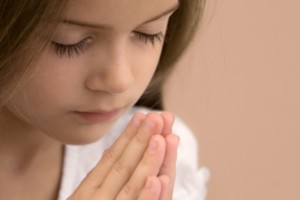Praying With Children
 It’s a troubling fact today that many Catholic children don’t know the basics of the faith. Many come to religious instruction in parishes without knowing how to make the Sign of the Cross or recite the Our Father or Hail Mary.
It’s a troubling fact today that many Catholic children don’t know the basics of the faith. Many come to religious instruction in parishes without knowing how to make the Sign of the Cross or recite the Our Father or Hail Mary.
Teaching children growing up in a secularized world, catechists and teachers can’t assume that their pupils know how to pray.
A new book seeks to address this problem. It’s called 70 Prayer Starters for Children…and those who teach them (Pauline), by Patricia Mathson, children’s ministry coordinator at Hope Family Center in Des Moines, Iowa.
The book is based on the simple assumption that children (and all humans) have an innate ability and desire to reach out to a Being beyond themselves. Prayer is a natural part of human life. Start with something kids know about, such as a sick grandmother, Mathson suggests, and gently lead them to a sense of charity for others. The greatest act of charity is to pray.
She does not speak of learning familiar prayers only by rote but counsels that children should be led to pray in their own words. “Only then will it become easier for them to share their thoughts with Jesus,” she writes. Give them opportunities throughout the day and begin a prayer they can finish with their own words. “God, sometimes I feel…” for example, or “Jesus, help me to be like you in…”
There are plenty of fun things to do that help kids ease into prayer: sit in a “prayer circle” or light candles in church and learn about how they represent “the light of the world.”
As the book progresses, Mathson introduces more advanced concepts and devotes a whole chapter on “praying with the Psalms.” For Jews and Christians, the Psalms represent some of the deepest, prayer-driven poetry ever composed, and Mathson, to her credit, does not feel they are too advanced for kids. Now is the time to introduce them to children, and she proposes some clever ways to do so. One way is to find in some Psalms various titles for God, such as God of all nations, God of forgiveness, God of love. It’s a spiritual treasure hunt.
Focus on the Psalms is a natural lead-in to another kind of prayer practice, one that is still unfamiliar even for many adults—lectio divina. This ancient practice of “divine reading” not only to understand Scripture but to lead to “conversation with God,” is a type of prayer whose benefits may be endless and which has not been tapped into by enough Christians today. It’s not expected that children become spiritual masters, of course, but Mathson describes a way that lectio divina can be introduced. Pupils exposed to this now may very well find it easier to grasp later in life, as their spirituality deepens.
“Tell the children you are going to share a Bible story with them,” Mathson writes. “Invite them to listen carefully for any word or phrase that stands out for them.” She gives a list of readings that work well with children, such as the parable of the Good Samaritan. The teacher is to ask children to share with others which word or phrase stood out in their listening and why they feel that’s important. The teacher is to read the story again and discuss “the message for our lives today.”
The book culminates with a chapter in which children can explore the different parts of the Mass. In addition, children are introduced to the concept of the traditional kinds of prayer—blessing, petition, intercession, thanksgiving and praise.
If a class can get through this book in one school year—or even if it takes several—students will be well on their way to being prayerful Catholic young men and women who will take their faith more seriously. And who knows, many children may bring the lessons home, helping their parents learn something about prayer. We can only pray.
70 Prayer Starters for Children is available from Pauline Books & Media.

